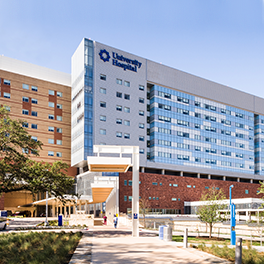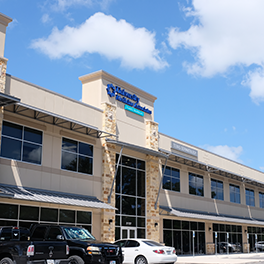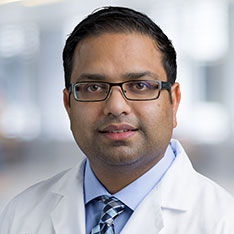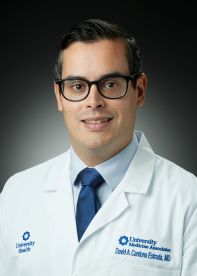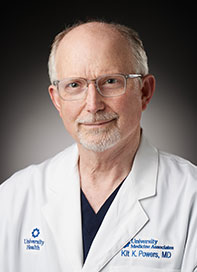-
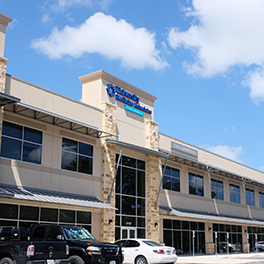
Adult Congenital Heart Clinic Dominion Crossing
21727 I-10210-644-1230
Suite 107
San Antonio,TX 78257
The heart is a vital organ and is responsible for pumping blood and delivering oxygen throughout the body. When it does not function properly, serious health problems can occur.
Leading Cardiovascular Care
At the University Health Cardiovascular Center in San Antonio, our cardiologists provide advanced and compassionate heart care to patients across South Texas. We offer comprehensive cardiovascular services, from prevention and diagnosis to the most innovative treatments, all delivered by a multi-specialty team of heart and vascular specialists.

We combine nationally recognized expertise with state-of-the-art technology to create specialized facilities, such as the Structural Heart and Valve Center, Limb Salvage Clinic, Women’s Heart Center and the region's only accredited Comprehensive Care Center for Adult Congenital Heart Disease, recognized by the Adult Congenital Heart Association (ACHA).
Our commitment to delivering leading cardiovascular care in San Antonio is reflected in the honors we’ve earned. University Health is proud to hold the following awards and designations:
- Recognized as an Institute of Quality® for Cardiac Surgery by Aetna since 2022
- Certification for our Cardiac Rehabilitation Program by the American Association of Cardiovascular and Pulmonary Rehabilitation
- We are also the only health system in Central and South Texas to receive the American College of Cardiology Transcatheter Valve Certification.
Preventing Heart Disease in San Antonio
We believe the most effective care starts with prevention—that is why our heart specialists focus on heart disease prevention in San Antonio and across South Texas.
From understanding the role of artery health to learning how family history impacts your risk of heart disease, you can rely on our cardiologists to provide expert guidance on keeping your heart healthy.
We also offer free community resources related to heart disease prevention through our Institute for Public Health.
Conditions We Treat
A cardiologist specializes in diagnosing and treating diseases of the heart and blood vessels. Our team of heart doctors care for patients with both common and complex conditions, including:
- Arrhythmias and abnormal heart rhythms
- Congenital heart disease in adults
- Coronary artery disease and chest pain
- Heart failure
- Heart valve disorders
- Hypertension and high cholesterol
- Peripheral artery disease (PAD) and vascular conditions
Why the University Health Cardiovascular Center?
At the University Health Cardiovascular Center, patients can expect personalized heart care delivered by a multidisciplinary team of:
- Cardiologists, including adult congenital heart disease cardiologists, interventional cardiologists, electrophysiologists and preventive cardiologists
- Cardiac surgeons
- Cardiothoracic and vascular surgeons who performs heart surgery
- Cardiac care nurses
- Imaging specialists
- Perfusionists, who operates the heart-lung bypass machine during heart bypass surgery
- Physical or occupational therapists
Our state-of-the-art facilities support care at every stage, from early screenings and prevention to advanced interventional procedures and surgery. This approach allows us to provide seamless care, guiding patients smoothly from diagnosis through treatment, recovery and long-term follow-up.
Whether it’s managing risk factors or performing lifesaving interventions, our team is dedicated to helping patients achieve stronger heart health.
Heart and Vascular Specialists You Can Trust
Our heart team's commitment to excellence has been nationally recognized, from intake to discharge and rehab. In addition to being one of only two hospitals in San Antonio to receive the Cardiac Cath Lab with PCI Accreditation from the American College of Cardiology (ACC), we've also been recognized for the following:
- 2025 American College of Cardiology’s NCDR Chest Pain – MI Registry Platinum Performance Achievement Award
- 2024 Gold Level Extracorporeal Life Support Organization (ELSO) Award for Excellence in Life Support
- 2023 STRAC Comprehensive Resuscitation Center
- Center for complex arrhythmias, like VT ablation
- Accredited by the Intersocietal Accreditation Commission (IAC) for Adult and Pediatric Echocardiography, Nuclear Cardiology and Vascular Imaging
- Center for Lead Extraction
- Hypertrophic Cardiomyopathy Association Center of Excellence

Heart disease is the leading cause of death for both men and women.
Take our quick Heart Health Risk Assessment to understand your risk of heart disease and how to lower it







